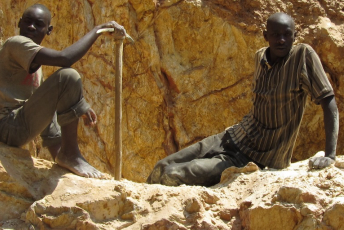Since his election in 2015, President John Magufuli has changed his minister of mining three times. Current Minister of Minerals, Dotto Biteko, is expected to address the smuggling of gemstones and tax evasion by mining companies. Following Biteko’s appointment in January, Magufuli gave him 30 days to install surveillance cameras in the newly fenced-off tanzanite mining field. The mining field covers an area of 8 km2. Construction of the 24 km fence started in July 2017 and was completed by April 2018.
Tanzanite is a precious gemstone that changes colour in different lighting conditions. Although deposits are not found anywhere in the world apart from Mererani, north of Dar es Salaam, the country is not the biggest exporter of the rare gemstone. Paul Masanja, commissioner at the minerals ministry says that Tanzania comes a distant third behind India and Kenya. Masanja, quoted in local media, said that while Tanzania exported only US$38 million worth of tanzanite in 2013, Kenya and India exported US$100 million and US$300 million respectively. Smuggling is one of the primary reasons for this and involves three distinct levels.
The first level requires paying a ‘finder’s’ fee to be connected with miners involved in smuggling. Kevin, a Tanzanian tanzanite trader who asked ENACT not to use his surname, said both small-scale artisanal and large-scale corporate tanzanite miners are involved in either smuggling or tax evasion. He added that smugglers bribe police up to US$9 000 to gain access to the mining field where they can buy tanzanite.
Level two includes forging mining licences and export permits. Alan Martin, a research expert in artisanal and small-scale mining, told ENACT that it is near impossible for a high-value product such as tanzanite to move without the complicity of government officials and criminal networks.
Level three is moving smuggled tanzanite through border points and routes where there are no security personnel. According to Martin, government officials are also involved in this stage. The fencing-off of the mines to deter smugglers seems to have increased revenues from sales of tanzanite. With the installation of surveillance cameras, an uptick in 2019 revenue from tanzanite sales is expected.
According to the Natural Resource Governance Institute, an NGO dedicated to improving countries’ governance over their natural resources, Tanzanian mining taxes are the highest in the world. This places a large tax burden on miners. These taxes include 18% value added tax of miners’ annual turnovers, 6% royalty, 5% withholding tax, 1% inspection and clearance fee among others. Heavy taxes and tariffs can contribute to tax evasion and increased smuggling of tanzanite. But in February 2019, the government waived one of the many taxes that small-scale miners have had to pay. Actions such as tax cuts encourage the registration of tanzanite miners, who are also often smugglers.
Such security measures and tax revisions show there is political will to combat the smuggling of the gemstone. To tap into the economic benefits of tanzanite, the country should pursue similar efforts that encourage fair trade and yield favourable results for both the government and miners.
Mohamed Daghar, Researcher, ENACT project, ISS







